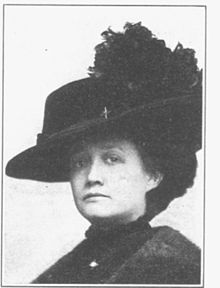- Ola Delight Smith
-
Ola Delight Lloyd Smith (January 21, 1880 – December 5, 1958) was an American telegrapher, journalist, and labor activist.
Biography
Ola Delight Lloyd was born in Mercer County, Illinois, in 1880. Her father, John Alva Lloyd, was a farmer; her mother, Celeste Crawford "Lettie" Long, died when Ola was nine. The family moved many times during her childhood, residing for various periods of time in Mississippi, Alabama, Georgia, Nebraska, Iowa, and Wisconsin.[1]
While the family was living in Epes, Alabama, Ola became interested in telegraphy and used a practice set at home to learn Morse code. She took a telegraphy course at the Alabama Polytechnic Institute for Girls in Montevallo (now known as the University of Montevallo) and began working as a telegrapher, first for the Queen and Crescent Route and later for the Postal Telegraph Company. In 1901, Ola married Edgar B. Smith, a traveling salesman, and the couple moved to Birmingham, Alabama, where she managed a Western Union office. They later moved to Gainesville, Georgia, where Ola again worked for the Postal Telegraph; she joined the Commercial Telegraphers Union of America (CTUA) in 1904. The CTUA had been formed in 1902 to represent the interests of commercial telegraphers. In 1906, she also joined the Order of Railroad Telegraphers (ORT), which had been formed in 1886 to represent telegraphers who worked for the railroads.[2]
In 1907, Ola and her husband moved to Atlanta, Georgia. The CTUA declared a nationwide strike in August 1907 after several union members were dismissed by Western Union for participating in union activities. Ola Delight Smith played an active role in the strike, which ended in defeat for the union in November 1907. As a result, she was blacklisted by Western Union and was unable to find employment as a telegrapher.[3]
To supplement her husband's meager and erratic income, she entered into a variety of ventures, including running a boarding house, writing business letters, and providing general secretarial services. She continued to participate in union activities, and in May 1908 organized the Dixie Twin Order Telegraphers' Club in order to coordinate social activities involving both the CTUA and the ORT. She organized a telegraphers' convention that was held in Atlanta in May 1909, and served as president of the ladies' auxiliary of the Twin Order Telegraphers until 1913. She also served as the CTUA representative to the Atlanta Federation of Trades and the Georgia Federation of Labor.[4]
In 1906, she had begun writing for the Atlanta Journal of Labor, published by the Atlanta Federation of Trades, and eventually became an associate editor. She wrote columns on a variety of subjects, focusing on the need for organized labor and women's role in labor unions. She became an advocate for the rights of children, and served as the Georgia Federation of Labor's delegate to the Southern Conference on Women and Child Labor.
In 1914, Atlanta textile workers belonging to the United Textile Workers Union went on strike against the Fulton Bag and Cotton Mills to protest poor working conditions and the employment of children in the mills. Ola Delight Smith became involved as a labor organizer. She took photographs to document working conditions and to illustrate the condition of children working in the mills. Her activities came to the attention of the mill owners, who hired operatives to spy on her and report on her activities.
The mill owners began to clandestinely circulate attacks on her reputation, resulting in her being dismissed as strike leader in November 1914. Her husband filed for divorce at the same time, aided by a lawyer who represented the mills. The strike finally ended in defeat for the UTW in 1915.[5]
Ola Delight Smith left Atlanta and resumed her work as a telegrapher, operating for the Atchison, Topeka, and Santa Fe Railway in Texas. In 1919 she moved to Portland, Oregon, where she went to work for Western Union and resumed her affiliation with the CTUA. She became prominent in the Oregon labor movement, and remained active until her death in 1958.
References
- ^ http://trees.ancestry.com/tree/7531470/person/-655721543?ssrc=
- ^ Hall, J,: "O. Delight Smith's Progressive Era: Labor, Feminism and Reform in the Urban South", in Visible Women: New Essays on American Activism, ed. Nancy A. Hewitt and Suzanne Lebsock (Urbana and Chicago: University of Illinois Press, 1993) pp. 169-171.
- ^ Jepsen, Thomas C., My Sisters Telegraphic: Women in the Telegraph Office, 2000, Ohio University Press, pp. 166 - 181.
- ^ “The Atlanta Convention”, Railroad Telegrapher, February 1909: 584-5.
- ^ Hall, J, pp. 182-184.
Further reading
- "Material relating to Ola Delight Smith". Fulton Bag and Cotton Mills Digital Collection. http://search.library.gatech.edu/dimes/results.php?keyword=ola+delight+smith&browseby=keyword. Retrieved 2011-03-01.
- Fink, Gary M., The Fulton Bag and Cotton Mills Strike of 1914-1915. ILR Press, 1993.
- Scott, Anne Firor, Making the Invisible Woman Visible. University of Illinois Press, 1984.
Categories:- Women in technology
- 1880 births
- 1958 deaths
- University of Montevallo alumni
- American labor leaders
- Telegraphy
Wikimedia Foundation. 2010.

